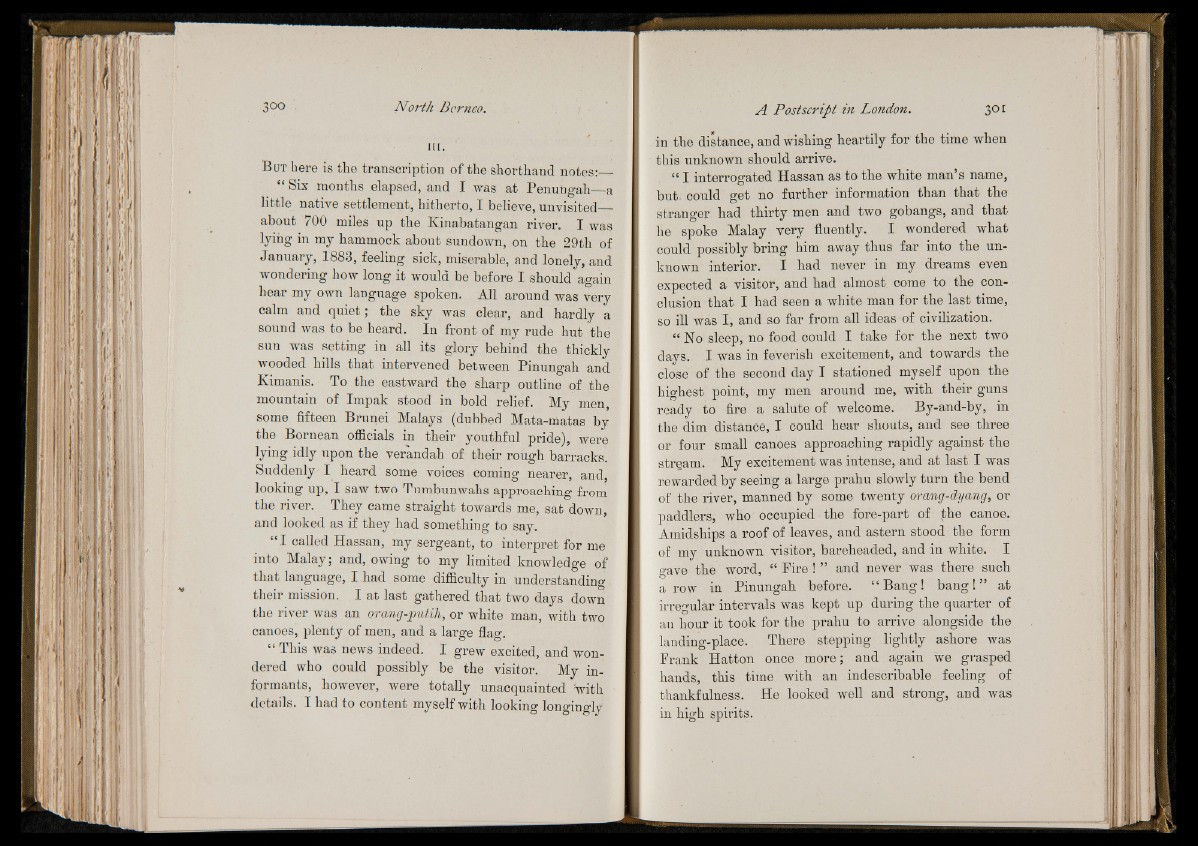
in.
B ut here is the transcription of the shorthand notes:__
“ Six months elapsed, and I was at Penungah—a
little native settlement, hitherto, I believe, unvisited__
about 700 miles up the Kinabatangan river. I was
lying in my hammock about sundown, on the 29th of
January, 1888, feeling sick, miserable, and lonely, and
wondering how long it would be before I should again
hear my own language spoken. All around was very
calm and q u ie t; the sky was clear, and hardly a
sound was to be heard. In front of my rude hut the
sun was setting in all its glory behind the thickly
wooded hills that intervened between Pinungah and
Kimanis. To the eastward the sharp outline of the
mountain of Impak stood in bold relief. My men,
some fifteen Brunei Malays (dubbed Mata-matas by
the Bornean officials in their youthful pride), were
lying idly upon the verandah of their rough barracks.
Suddenly I heard some voices coming nearer, and,
looking up, I saw two Tumbunwahs approaching from
the river. They came straight towards me, sat down,
and looked as if they had something to say.
“ I called Hassan, my sergeant, to interpret for me
into Malay; and, owing to my limited knowledge of
that language, I had some difficulty in understanding
their mission. I at last gathered that two days down
the river was an orang-putih, or white man, with two
canoes, plenty of men, and a large flag.
“ This was news indeed. I grew excited, and wondered
who could possibly be the visitor. My informants,
however, were totally unacquainted Vith
details. I had to content myself with looking longingly
in the distance, and wishing heartily for the time when
this unknown should arrive.
“ I interrogated Hassan as to the white man’s name,
but. could get no further information than that the
stranger had thirty men and two gobangs, and that
he spoke Malay very fluently. I wondered what
could possibly bring him away thus far into the unknown
interior. I had never in my dreams even
expected a visitor, and had almost come to the conclusion
that I had seen a white man for the last time,
so ill was I, and so far from all ideas-of civilization.
“ No sleep, no food could I take for the next two
days. I was in feverish excitement, and towards the
close of the second day I stationed myself upon the
highest point, my men around me, with their guns
ready to fire a salute of welcome. By-and-by, in
the dim distance, I could hear shouts, and see three
or four small canoes approaching rapidly against the
stream. My excitement was intense, and at last I was
rewarded by seeing a large prahu slowly turn the bend
of the river, manned by some twenty orang-dyang, or
paddlers, who occupied the fore-part of {¡he canoe.
Amidships a roof of leaves, and astern stood the form
of my unknown visitor, bareheaded, and in white. I
p-ave the word, H Fire ! ” and o ■ y never was there such
a row in Pinungah before. “ Bang! b a n g !” at
irregular intervals was kept up during the quarter of
an hour it took for the prahu to arrive alongside the
landing-place. There stepping lightly ashore was
Frank Hatton once more; and again we grasped
hands, this time with an indescribable feeling of
thankfulness. He looked well and strong, and was
in high spirits.